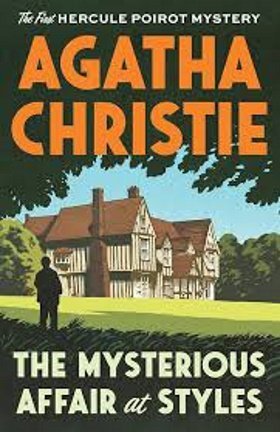There would be pictures of Styles, snap-shots of “The family leaving the Inquest”—the village photographer had not been idle! All the things that one had read a hundred times—things that happen to other people, not to oneself. And now, in this house, a murder had been committed. In front of us were “the detectives in charge of the case.” The well-known glib phraseology passed rapidly through my mind in the interval before Poirot opened the proceedings.
I think everyone was a little surprised that it should be he and not one of the official detectives who took the initiative.
“Mesdames and messieurs,” said Poirot, bowing as though he were a celebrity about to deliver a lecture, “I have asked you to come here all together, for a certain object. That object, it concerns Mr. Alfred Inglethorp.”
Inglethorp was sitting a little by himself—I think, unconsciously, everyone had drawn his chair slightly away from him—and he gave a faint start as Poirot pronounced his name.
“Mr. Inglethorp,” said Poirot, addressing him directly, “a very dark shadow is resting on this house—the shadow of murder.”
Inglethorp shook his head sadly.
“My poor wife,” he murmured. “Poor Emily! It is terrible.”
“I do not think, monsieur,” said Poirot pointedly, “that you quite realize how terrible it may be—for you.” And as Inglethorp did not appear to understand, he added: “Mr. Inglethorp, you are standing in very grave danger.”
The two detectives fidgeted. I saw the official caution “Anything you say will be used in evidence against you,” actually hovering on Summerhaye’s lips. Poirot went on.
“Do you understand now, monsieur?”
“No. What do you mean?”
“I mean,” said Poirot deliberately, “that you are suspected of poisoning your wife.”
A little gasp ran round the circle at this plain speaking.
“Good heavens!” cried Inglethorp, starting up. “What a monstrous idea! I—poison my dearest Emily!”
“I do not think”—Poirot watched him narrowly—“that you quite realize the unfavourable nature of your evidence at the inquest. Mr. Inglethorp, knowing what I have now told you, do you still refuse to say where you were at six o’clock on Monday afternoon?”
With a groan, Alfred Inglethorp sank down again and buried his face in his hands. Poirot approached and stood over him.
“Speak!” he cried menacingly.
With an effort, Inglethorp raised his face from his hands. Then, slowly and deliberately, he shook his head.
“You will not speak?”
“No. I do not believe that anyone could be so monstrous as to accuse me of what you say.”
Poirot nodded thoughtfully, like a man whose mind is made up.
“Soit!” he said. “Then I must speak for you.”
Alfred Inglethorp sprang up again.
“You? How can you speak? You do not know——” he broke off abruptly.
Poirot turned to face us. “Mesdames and messieurs! I speak! Listen! I, Hercule Poirot, affirm that the man who entered the chemist’s shop, and purchased strychnine at six o’clock on Monday last was not Mr. Inglethorp, for at six o’clock on that day Mr. Inglethorp was escorting Mrs. Raikes back to her home from a neighbouring farm. I can produce no less than five witnesses to swear to having seen them together, either at six or just after and, as you may know, the Abbey Farm, Mrs. Raikes’s home, is at least two and a half miles distant from the village. There is absolutely no question as to the alibi!”
CHAPTER VIII.
FRESH SUSPICIONS
There was a moment’s stupefied silence. Japp, who was the least surprised of any of us, was the first to speak.
“My word,” he cried, “you’re the goods! And no mistake, Mr. Poirot! These witnesses of yours are all right, I suppose?”
“Voilà! I have prepared a list of them—names and addresses. You must see them, of course. But you will find it all right.”
“I’m sure of that.” Japp lowered his voice. “I’m much obliged to you. A pretty mare’s nest arresting him would have been.” He turned to Inglethorp. “But, if you’ll excuse me, sir, why couldn’t you say all this at the inquest?”
“I will tell you why,” interrupted Poirot. “There was a certain rumour——”
“A most malicious and utterly untrue one,” interrupted Alfred Inglethorp in an agitated voice.
“And Mr. Inglethorp was anxious to have no scandal revived just at present. Am I right?”
“Quite right.” Inglethorp nodded. “With my poor Emily not yet buried, can you wonder I was anxious that no more lying rumours should be started.”
“Between you and me, sir,” remarked Japp, “I’d sooner have any amount of rumours than be arrested for murder. And I venture to think your poor lady would have felt the same. And, if it hadn’t been for Mr. Poirot here, arrested you would have been, as sure as eggs is eggs!”
“I was foolish, no doubt,” murmured Inglethorp. “But you do not know, inspector, how I have been persecuted and maligned.” And he shot a baleful glance at Evelyn Howard.
“Now, sir,” said Japp, turning briskly to John, “I should like to see the lady’s bedroom, please, and after that I’ll have a little chat with the servants. Don’t you bother about anything. Mr. Poirot, here, will show me the way.”
As they all went out of the room, Poirot turned and made me a sign to follow him upstairs. There he caught me by the arm, and drew me aside.
“Quick, go to the other wing. Stand there—just this side of the baize door. Do not move till I come.” Then, turning rapidly, he rejoined the two detectives.

























